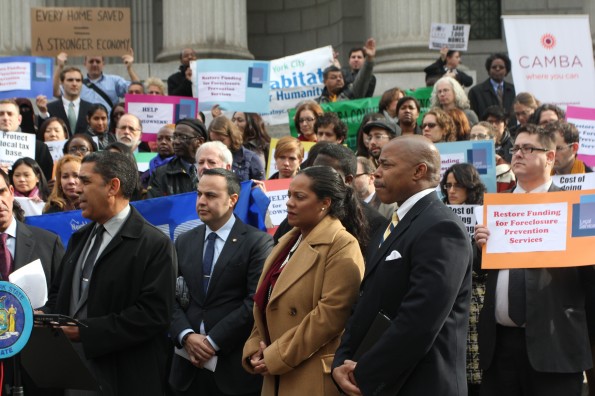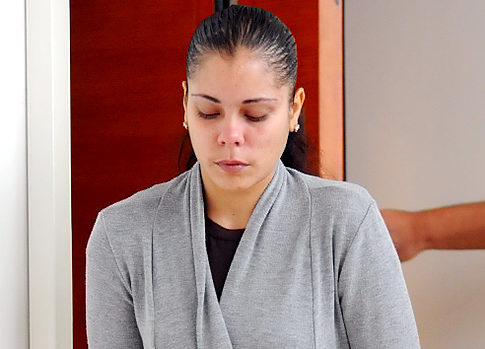
Legal services providers rallied last month for state funding for foreclosure prevention services. (CELIA LLOPIS-JEPSEN/Bronx Ink)
Room 607 at Bronx County Courthouse isn’t a typical courtroom. The judge’s bench is empty, and the jury box, too. A fax machine stands where a court reporter might otherwise sit, and filing cabinets line one of the walls.
A dozen homeowners and bank lawyers are waiting for their cases to come up. When they do, they walk to one of two desks set up at opposite ends of the cavernous room to talk not to a judge but to a court attorney. These are foreclosure conferences.
Last year alone, banks filed more than 2,500 foreclosures in the Bronx, which has the lowest home ownership rate in the city, but the highest foreclosure rate. While the banks have lawyers to make their case at court, most of the homeowners don’t.
“Foreclosure is all about power dynamics,” said Justin Haines, sitting in a spartan office in a converted courtroom adjacent to Room 607. Haines heads this office — Legal Services NYC’s foreclosure unit — which offers free legal counsel to homeowners who risk losing their homes.
“When I first switched over to foreclosures, it was hard for me to decipher some of the exotic loans these banks are offering,” said Haines, who previously represented tenants in Housing Court cases.
As the economy has worsened, demand has soared for services offered by nonprofits like Legal Services NYC, which provide legal counsel to low-income Americans in civil matters like foreclosure. But the same struggling economy has also hit these nonprofits hard, squeezing their main funding sources: federal and state budgets and special lawyers’ accounts that pay interest toward civil legal aid.
In the latest blow, on Nov. 17, Congress slashed $56 million in funding for the Legal Services Corporation (LSC), the congressionally-mandated agency that doles out grants to 136 nonprofits nationwide to address the “justice gap” — the US population that cannot afford counsel for civil legal matters. Among those nonprofits is Legal Services NYC.
“These cuts are devastating,” says Jill Siegel, the deputy project director of Legal Services’ Bronx division.
Legal Services already suffered a 4 percent budget cut this year and will lose another $800,000 in the next, Siegel said. Worse yet, it will lose 20 percent of its LSC funding for 2013 to 2014 under changes to the federal formula for distributing the funds, which currently pay for about 44 percent of pro bono legal services nationwide. The 15 percent cutback in LSC grant money last month comes on top of this.
All of these cuts will reverberate in the Bronx, where demand for civil legal aid in the Bronx is growing, said Siegel, whose organization handles everything from wrongful cancellation of public assistance to custody battles in domestic violence cases. Navigating civil courts without legal assistance is like running an “obstacle course,” she said.
Haines’ foreclosure unit is fighting for refunding of a state grant. Last year, Governor Andrew Cuomo cut a special budget for legal services combatting foreclosures. Late last month, Haines and others from Legal Services NYC and other housing counseling and legal service providers held a rally on the steps of Manhattan Supreme Court to ask the state assembly and governor to put foreclosure prevention back in the budget.
At the Bronx courthouse, Haines’ foreclosure office is quiet. On a morning in November, a middle-aged couple sat huddled over papers, waiting their turn for a consultation. Fliers on the wall warned homeowners behind on their mortgages against loan modification scams — agencies that promise they can stop foreclosure on a home in return for steep fees.
Though there were only a few walk-ins, the office’s three attorneys and two paralegals had full caseloads. “I wish I had three times as much staff,” said Haines, who worked through lunch. The couple waited two hours before he was able to see them.
Haines believes providing legal counsel for families facing foreclosure pays off for the government and community. “If you talk about economic recovery, it erodes the tax base when houses are empty,” he said. While most of New York’s homeless population — currently at record-high levels — have been evicted from apartments rather than houses, in the Bronx, about 10 percent come from foreclosures, he said. Many are homeowners who’ve lost their jobs. Others fall behind when tenants they rent rooms to lose their jobs and start missing their monthly payments.
Often Haines represents homeowners in their absence. “In foreclosure, people are often dealing with underemployment,” he said. “There are so many court appearances, and if they miss work that often, they could really get into trouble.”
At the same time that funding cuts pummel Legal Services, other providers in New York are suffering, too — even those not dependent on congressional allocations. Legal Aid Services, which does not receive LSC funding, lost millions in state funding in recent years and hundreds of thousands in city funding. To cope with the cuts, it shed dozens of staff positions from its already overtaxed civil division. For every person the civil practice helps, another eight are turned away.
That reflects a nationwide phenomenon. Legal services providers across the country trimmed their payrolls in recent years as government and IOLTA funding shrank. IOLTA (interest on lawyer trust account) funds, or, in New York, IOLA (interest on lawyers’ accounts), are funds that collect interest from escrow accounts where lawyers hold clients’ money.
Back in the heady days of the real estate boom, these funds were raking in money. Trust accounts seemed an ideal solution to fund civil legal services without costing taxpayers a dime.
“I started in 2005,” Haines said, referring to his previous job at the Legal Aid Society. “And in 2007, we were all dreaming, finding the holes in our work. We could actually design what we needed.”
Then the bubble burst, and legal service providers found themselves struggling just to maintain the same level of services.
At the foreclosure unit, the understaffed team allocates its time carefully.
“People come in, sign in, give us information about their case,” Haines said. “We help them prepare pro se papers” to defend themselves. Often their help stops there. “We really only get involved if there are significant defenses.”
The situation is similar at Housing Court and for public assistance cases.
In public assistance cases, having an advocate can make all the difference. In May, the Urban Justice Center, another New York provider of pro bono legal services, found that 86 percent of decisions to cut off public assistance are cancelled when challenged in hearings. Many of the cancellations can be traced to simple clerical errors at the Human Resources Administration, yet resolving them can be tricky.
Still, few nonprofits have units dedicated to handling public assistance cases, and those that do can’t meet the demand.
“We have to decide which cases would be more difficult for an unrepresented person,” said Maryanne Joyce, who works at Bronx Legal Services’ public benefits unit. Joyce represents appellants who have had their public assistance revoked.
One problem for Joyce’s unit is that many legal services programs are paid for by targeted funds — a mixed blessing. An example is the New York State Assembly’s budget for helping homeowners stave off foreclosures. While Legal Services is grateful for such injections, targeted funding tends to cluster around a few popular causes. Public assistance isn’t one of them.
“It’s not an area that people find compelling,” said Joyce, whose unit has just two staff lawyers and one paralegal. “So it’s not easy to fundraise.”
That’s where LSC funds become all the more precious. The LSC funds are unrestricted. That means Legal Services NYC can apply the money where it’s needed most, as long as it serves the population that qualifies for legal services. Clients must fall below the income threshold of 125 percent of the national poverty line, or about $28,000 per year for a family of four.
In its most recent report on the state of the nation’s justice gap in 2009, the LSC cited studies indicating, not surprisingly, that litigants with legal counsel fare better than those without. Yet on average, LSC-funded programs turn away one client for every client they accept nationwide. And legal services programs as a whole — including those not funded by the LSC — serve only about one-fifth of the needs of low-income Americans.
The consequences of this are visible at Bronx Housing Court. On a typical day, the courtrooms and halls alike are packed with tenants waiting their turn before a judge. Sometimes the line to enter the courthouse winds out the door and along the front of the building.
While the vast majority of the tenants do not have legal counsel, the opposite holds true for the landlords.
“The landlords pay $150 an hour for a lawyer,” said Wanda Salaman, director of Mothers on the Move, a local nonprofit in Hunts Point. “The tenants can’t afford that.”
Tenants in the area often turn to Salaman’s group for advice on eviction cases, and Salaman refers them to legal services providers for help. But the options in the Bronx fall far short of meeting the community’s needs, and with the impending LSC cuts and funding redistribution, that is unlikely to improve.
At the rally outside Supreme Court last month, state senators who opposed cutting the foreclosure prevention budget pleaded for refunding the services.
Compared to the losses in tax revenue and property value that foreclosures represent, “$25 million is a drop in the bucket,” said Adriano Espaillat, who represents Manhattan.
Senator Jeffrey Klein of the Bronx and Westchester said skimping on foreclosure prevention services “makes no economic sense.” A protestor in the crowd behind him held up a sign that read simply: “Every home saved = a stronger economy.”
In the Bronx, banks have moved to foreclose on another 260 homes in the past three months, Klein’s office said. Citywide, the figure is 1,800.
“We’re not out of the woods yet,” Klein told the crowd.






